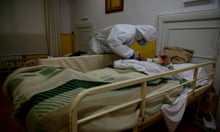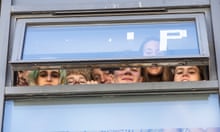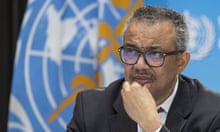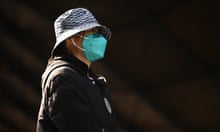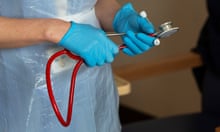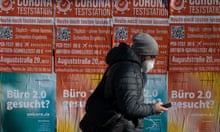Masks have played a key role in keeping us all safe throughout the Covid-19 pandemic. At the start, masks helped flatten the curve to protect our hospital systems, and since, masks have helped make public spaces and essential services more open and accessible to everyone. Many studies show that masks work, and they work best when everyone wears a high-quality one to protect each other. Masks are magnificent.
Yet, three years into the pandemic, we still see conflicting stories in the news about masks on a daily basis. The latest culprit powering the confounding headlines is a new scientific review published in Cochrane. The paper analyzes many different studies that assess how physical measures – including masks – fare against respiratory viruses.
The analysis is flawed because it compares apples to oranges. The paper mixes together studies that were conducted in different environments with different transmission risks. It also combines studies where masks were worn part of the time with studies where masks are worn all the time. And it blends studies that looked at Covid-19 with studies that looked at influenza.
If apples work and oranges don’t, but your analysis mixes them together, you may come to the false conclusion that apples don’t work. Out of the 78 papers analyzed in the review, only two actually studied masking during the Covid-19 pandemic. And both of those found that masks did protect wearers from Covid-19. But these studies are drowned out by the greater number of studies on influenza included, where the benefit of masking is harder to detect because it’s a far less contagious virus than Covid-19.
Even the authors themselves acknowledge in the paper: “The high risk of bias in the trials, variation in outcome measurement, and relatively low adherence with the interventions during the studies hampers drawing firm conclusions.”
The clear problems with the study did not stop loud voices from exaggerating its findings on large platforms. Bret Stephens proclaimed in the New York Times that “The Mask Mandates Did Nothing. Will Any Lessons Be Learned?” And Tom Jefferson, first author of the Cochrane paper, asserted in an interview: “There is just no evidence that [masks] make any difference. Full stop.”
Neither are objective nor reliable sources. Stephens once called global warming “mass hysteria” and claimed climate science had been “discredited”. Jefferson works for the Brownstone Institute, a Covid-19 misinformation group that is powered by dark money.
The mischaracterization of the Cochrane review by its authors and like-minded supporters is deliberate. Those with vested interests are sowing doubt about the science of Covid-19 protections by using the same disinformation playbook that tobacco companies, the fossil fuel industry and the anti-vax movement have used in the past.
The overselling of the Cochrane study is a classic example of cherry-picking, where biased groups highlight a subset of data that support their position, while ignoring the larger pool of evidence that disagrees with them. Many direct studies in labs show that high-quality masks significantly reduce the number of viral particles mask-wearers inhale and emit, but these are intentionally omitted in the arguments of anti-maskers.
These disinformation tactics are successfully quashing public health policies. Policymakers are susceptible to bad faith arguments about masks because they are beholden to short-term corporate interests. Masks are a visible symbol that the pandemic is ongoing, and politicians fear that these reminders stop people from consuming. It’s easy to lie to those who want to believe.
Covid-19 is still a crisis that requires attention and action. Covid-19 is still a top three cause of death, millions of people are getting long Covid and many are unable to work as a result, and without public health protections, higher-risk people, including people who are immunocompromised, disabled and/or elderly, are unable to access essential needs like healthcare and public transport safely, and are being excluded from public life. The pandemic isn’t over. It is only becoming even more unjust and inequitable.
As high levels of Covid-19 transmission persist over the long term, we need to prioritize policies that make society open and accessible to everyone, especially for those at higher risk. Masks remain a key solution. While masks alone can’t single-handedly stop the pandemic because Covid-19 spreads fast in places where masks come off, such as in households and social settings, masks help keep people safe in spaces where they can wear them continuously, such as in hospitals and on public transit.
The CDC still recommends masks on public transport at all times, in healthcare settings when transmission is high and in all indoor public spaces when hospitalizations are high too. And though many political leaders have abandoned their responsibilities, some states and counties rightfully still have mask mandates in some essential spaces. In addition, mask guides put together by groups around the country show that many individual businesses, workplaces and public spaces are continuing to protect their workers and communities by requiring masks.
We could do much more. Polls consistently show that the majority of the public, especially low-income communities and communities of color, support mask mandates. But because many places have dropped mask mandates, fewer people are wearing masks. CDC research shows that people are more willing to wear a mask when there’s high Covid transmission, but most also think Covid-19 transmission levels are much lower than they actually are. Another barrier is that a number of people can’t afford N95 and KN95 masks, but the government is not providing them for free. Widespread disinformation about the science of masks undermines policy and education efforts that can bridge these gaps.
This doesn’t mean that we don’t need better studies on masks. In science, we always seek more evidence. Better studies will help us implement more effective mask policies. There is much more we can learn about what messages and policies work best to encourage more people to wear masks more frequently, wear them properly, and wear high-quality masks like N95s.
But we need to stop giving so much air to bad faith actors. Their goal is to exhaust us and numb us into losing empathy and giving up. Unchecked Covid-19 spread is still significantly harming and disrupting the lives of many people, especially those who are at higher risk. We can’t let the avalanche of disinformation give us a convenient excuse to look the other way. Plenty of science shows us that masks protect ourselves and our communities when we all wear one, and masks are still needed now. Let’s put that science into action.
Dr Lucky Tran is a scientist and public health communicator who works at Columbia University. During the pandemic, he has led several efforts to provide the latest information about Covid-19 to the public and policymakers, and advocate for more equitable and just public health policies. He holds a PhD in biochemistry from the University of Cambridge

